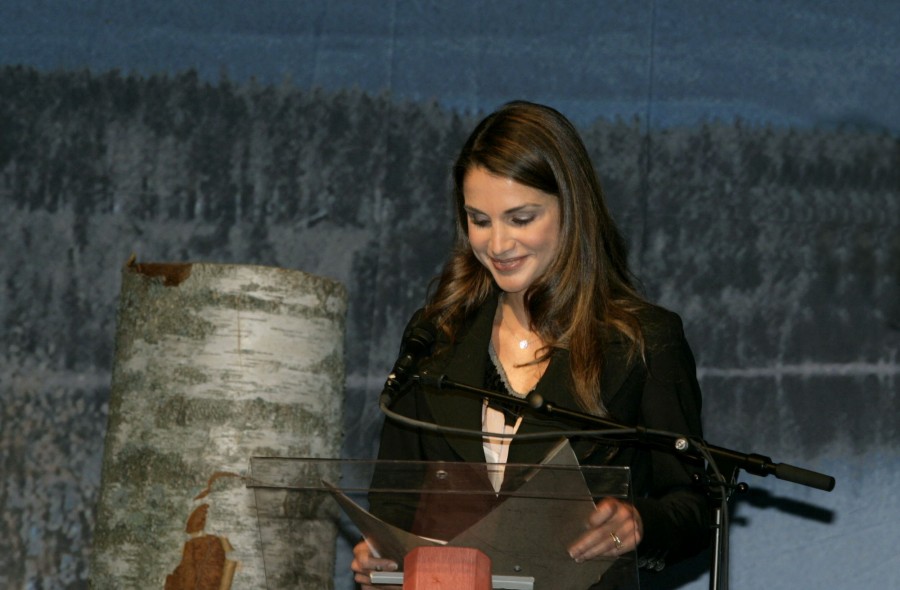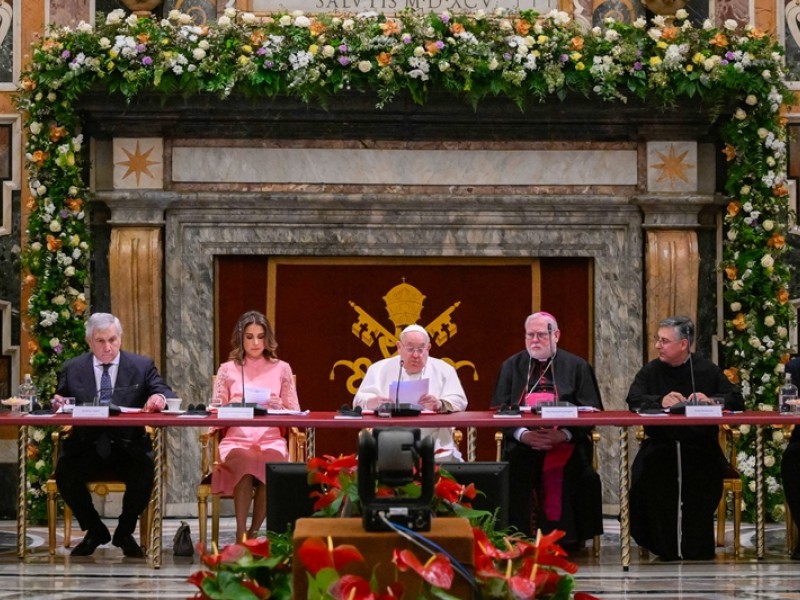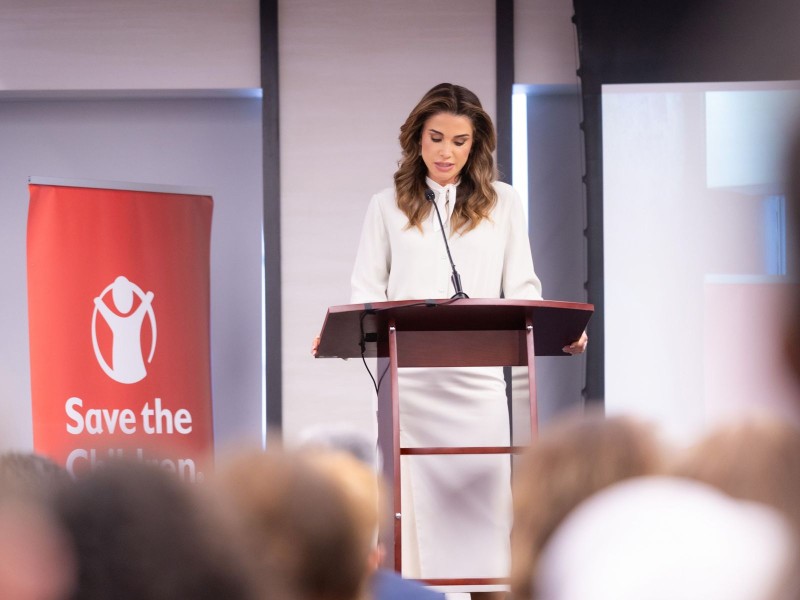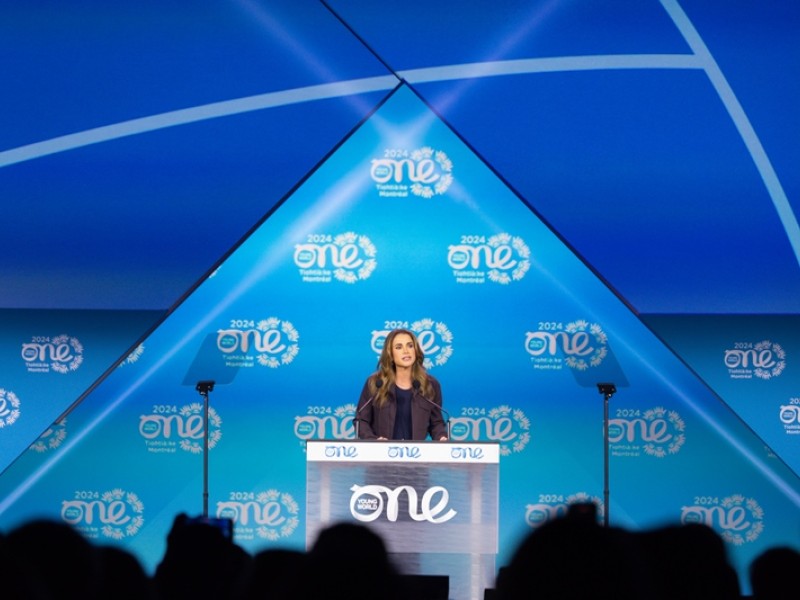Queen Rania's Speech at Tallberg Forum 2007 - Tallberg, Sweden

"Thank you, Bo.
Your Royal Highness, Ms. Fr?stad, Ms. Norrfalk, ladies and gentleman…
One of Sweden’s greatest gifts to the world is the legacy of Alfred Nobel. And in 1964, as some of you may remember, the Nobel Peace Prize went to Dr. Martin Luther King.
It was before I was born. But rereading the speech that Dr. King gave at the ceremony, it seemed to me it would have been a wonderful address for this conference. He passionately described a “great world house,” within which all of humanity must learn to live together – black and white, rich and poor, from East and West, of every faith -- because we could no longer live without each other.
Yet, his hopeful vision came before its time – a blueprint that we lacked the tools to build. Just four years later, Dr. King was dead, and the world was wracked with turmoil. America was fighting in Vietnam. The Middle East was rent with hostility. Soviet tanks crushed the hopes of the Prague Spring. Student protesters clashed with police from Paris to Mexico City.
As 1968 drew to a close, the “great world house” seemed only a dream.
And then, Christmas Eve, the Apollo 8 astronauts took a photo they called “Earthrise” – an image of our beautiful blue planet, rising over the moon’s grey horizon.
For the first time, the members of the human family could see our common home, and we were forced to confront the oneness of our existence. There was Earth, united, whole, unblemished by manmade divisions. It was as if, in the words of T.S. Eliot, we were able “to know the place for the first time” – not just a collection of separate communities, countries, or even continents… but a single global commons we were privileged to share.
I wish we could say that iconic photo was enough to inspire world peace. Regrettably, almost four decades later, the dream of peace has yet to be reached. But many experts credit the Earthrise image with helping launch the environmental movement… and the spirit of global consciousness you carry forward in Tallberg today.
I am honored to join you here for these discussions of our planet’s future… and how to improve human welfare without destroying the natural systems that support us. As temporary custodians of the Earth, we have no greater responsibility. As the forebears of generations unseen, we have no greater moral duty.
Yet, as we consider the conference theme – How on Earth can we live together? – I would like to focus on the social dimensions of the task. Because in order to safeguard the planet we cherish, we must learn to work together… and if we are to work together, we must learn to get along.
Those of you who have seen “An Inconvenient Truth” will recall how Vice President Al Gore contrasts the well-known Earthrise image with present day satellite photos. It is shocking to see the melting glaciers, shrinking lakes, and receding coasts.
Yet even as our environment is being transformed… so too our social landscapes are shifting. Borders are becoming abstract, traditional customs are merging with new ways, new cultures are making inroads on old societies. We know that globalization brings many benefits – but change can be daunting as well. And some people feel so threatened by the thought of the unknown that they have hunkered down within the familiar… clinging ferociously to what they know… and trying to wall out what they do not.
These anxieties -- reinforced by September 11 and all that has happened since -- have resulted in a paradox both troubling and sad: Even as technology has shrunk the world into a village, we find ourselves increasingly divided. As global challenges underscore our interdependence, too many of us are pushing each other away at precisely the time we should be pulling together.
We see it in the mutual misunderstanding afflicting the world’s diverse cultures, not only among different countries but increasingly within them as well. We hear tense debates over immigration, assimilation, and the balance between tradition and modernity.
And for me, as a Muslim and a mother of four, the schism that worries me most is the growing gulf of perception and trust between the Muslim world and the West. The only people who benefit from our disunity are the extremists – the very forces who threaten the hopes we share for a better tomorrow.
That is why, just as our changing ecosystem requires us to adapt… to adjust our behavior… and to halt, constrain, and reverse destructive trends… I believe these shifts in our social environment demand our enlightened response. I am concerned that the longer we wait to build genuine multicultural understanding, the more human nature will be degraded by ignorance, suspicion, and fear.
So let me take a provocative stand, and call for a new global warming – a positive, collective climate change within our heads and hearts. We need to take a vocal stand against stereotyping and prejudice – and melt the mental barriers that distinguish “us” from “them.” It is time to reassert the values humanity holds in common, and put tolerance, trust, respect, and compassion at the core of our relations with one another. We are one human family, and co-inhabitants of one world.
But consolidating our human family cannot just be a job for one side. All of us need to work harder to see one another’s point of view – to appreciate how our varied perspectives color our sense of reality.
My aim is not to pass judgment. I do not want to tell you what to think – but rather, to highlight the diverging narratives…the different ways that East and West interpret reality. In particular, I would like to explore the gap in perceptions of the Middle East – where mutual failure to appreciate the other side’s point of view is a greater barrier to communication than speaking different languages.
Take, for example, the way East and West perceive my part of the world. To Western eyes, violence, in-fighting, extremism, and suicide bombers frame the conflicts in my region. But to Arab eyes, it is injustice, occupation, desperation, and decades of sadness and suffering…most notably in Palestine where, after 50 years, the peace process is stumbling, while the humanitarian crisis is accelerating.
Or, take the status of women. From a Western perspective, Arab women may seem passive and oppressed – from the way they dress to the role they play in the home and family unit. Eastern eyes, however, see Arab women taking an ever greater role in society – as doctors, lawyers, teachers, journalists, politicians… and, at the same time, because Arab culture venerates the family, a woman’s predominant role in the household is seen as a source of strength.
Or take Islam, which for many in the East is a fundamental part of life – a moral compass that emphasizes mercy, equality, charity, tolerance, and peace. But for many in the West, the Islamic faith – what it stands for, what it means – has been equated with terrorists who claim to act in God’s name. Thus, from a Western vantage point, Islam may seem like a threat. But when you stand in Eastern shoes, Islam is under siege… distorted by violent extremists from within… and demonized from without.
To bridge these gaps in perception and narrative, we will have to engage in real dialogue so that we can truly learn to live to learn.
And I believe this Tallberg Forum is a wonderful place to start – because here at Tallberg, you already speak the language of humanity in your hearts.
You have come together from around the globe, from so many different landscapes of your own, to sit under one sky and share ideas as fellow human beings.
You are not here to press your own personal agendas, or to push for individual advantage… but rather to champion the common good – the survival of the planet we all call home.
You know that exchanges with people whose backgrounds are different from your own will add to the richness and depth of your understanding of the world… just as examining a vista from different angles, and in different shades of light, reveals to us nuance and beauty we may not have seen before.
And your mission here is not to hammer out a lowest-common-denominator consensus, but rather to absorb as many inspiring new insights as you can – and to take them back to your own environments, and help those bold insights to spread.
In all these ways, you are planting the seeds of cross-cultural common ground – from which the Tallberg spirit can take root around the world. My challenge to you, in your time together, and once you take flight on the wind, is to help the values you celebrate here to flourish wherever you go.
Thank you very much."
Featured
Queen Rania's official website
This website does not support old browsers. To view this website, Please upgrade your browser to IE 9 or greater
Your browser is out of date. It has known security flaws and may not display all features of this and other websites. Learn how to update your browser



